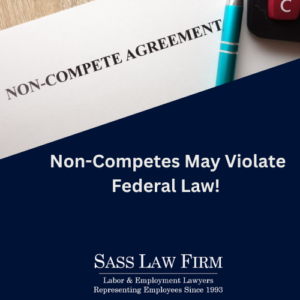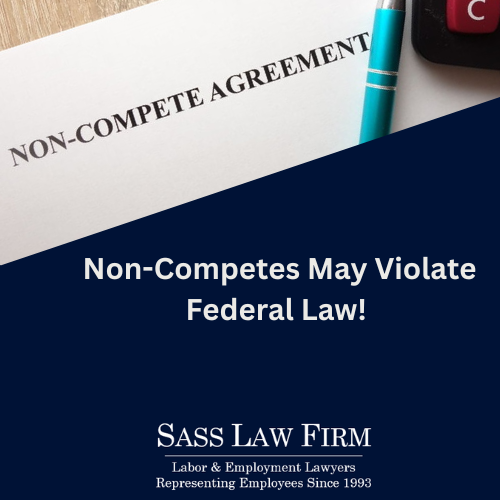 On May 30, 2023, Jennifer Abruzzo, the General Counsel for the National Labor Relations Board, issued memorandum GC 23-08 in which she recognized that overbroad non-compete agreements interfere with employees’ exercise of rights to engage in concerted activity under Section 7 of the National Labor Relations Act (the Act or NLRA). It is the General Counsel’s position that if an employer presents, maintains, and/or enforces such agreements, they violate the National Labor Relations Act. Employees protected by the NLRA who file complaints involving the enforcement or maintenance of non-competition agreements will be investigated and prosecuted as an unfair labor practice.
On May 30, 2023, Jennifer Abruzzo, the General Counsel for the National Labor Relations Board, issued memorandum GC 23-08 in which she recognized that overbroad non-compete agreements interfere with employees’ exercise of rights to engage in concerted activity under Section 7 of the National Labor Relations Act (the Act or NLRA). It is the General Counsel’s position that if an employer presents, maintains, and/or enforces such agreements, they violate the National Labor Relations Act. Employees protected by the NLRA who file complaints involving the enforcement or maintenance of non-competition agreements will be investigated and prosecuted as an unfair labor practice.
What is the rationale behind the NLRB’s position that a non-compete agreement is illegal under the NLRA?
Depending on the circumstances, a non-compete agreement may prevent workers from engaging in protected activity, such as using bargaining power throughout a labor dispute. General Counsel Abruzzo noted that a non-compete agreement could be illegal if the clause restricts workers from engaging in collective action.
General Counsel Abruzzo signaled to several instances of protected activity that a non-compete may chill, such as:
- Employees concertedly threatening to resign as a means of demanding better working conditions.
- Employees carrying out concerted threats to resign or otherwise concertedly resigning to secure improved working conditions.
- Employees accepting employment with a local competitor that can provide better working conditions.
- Employees soliciting their co-workers to work for a local competitor as part of a broader course of concerted activity.
- Employees seeking employment for the specific reason of joining other employees to take collective action against the employer.
Employees may be apprehensive to organize or act together to improve working conditions because they know they have a non-compete agreement and limited employment opportunities if they are terminated.
Notably, non-compete agreements also can disproportionately affect low-income employees who may not have the resources to find employment beyond the scope of the non-compete agreement.
Not all non-competes may be illegal.
In her memo, General Counsel Abruzzo notes that not all non-competition agreements violate the NLRA as there are some agreements where “employees could not reasonably construe the agreements to prohibit their acceptance of employment relationships subject to the Act’s protection.” Specifically, she cited as an example non-competes that do not violate the Act where they “clearly restrict only individuals’ managerial or ownership interests in a competing business or true independent-contractor relationships.” She also recognized that narrowly tailored non-compete agreements’ infringement on employee rights may be justified by special circumstances.
What does this mean for workers?
The legality of non-competes is being challenged by the Federal Trade Commission (See our Prior Blog: New Proposed Bill to Ban All Non-Compete Agreements) and now by the General Counsel for the NLRB.
For now, it means if you have a non-competition agreement and are covered under the National Labor Relations Act, you have an avenue to challenge your non-compete and potentially receive damages for lost opportunities for other employment and other damages caused by your employer maintaining an overbroad non-compete. Although this memo is the position of the General Counsel, the National Labor Relations Board has yet to rule on the legality of non-compete agreements.
If you have a non-compete agreement and are thinking about leaving your job, or if you are being asked to sign a non-compete as a condition of employment, we strongly urge you to consult with non-compete lawyers to review these agreements and understand your rights. Sass Law Firm represents workers in challenging the validity of non-compete agreements as well as defending workers who are sued by their former employers over such agreements.

